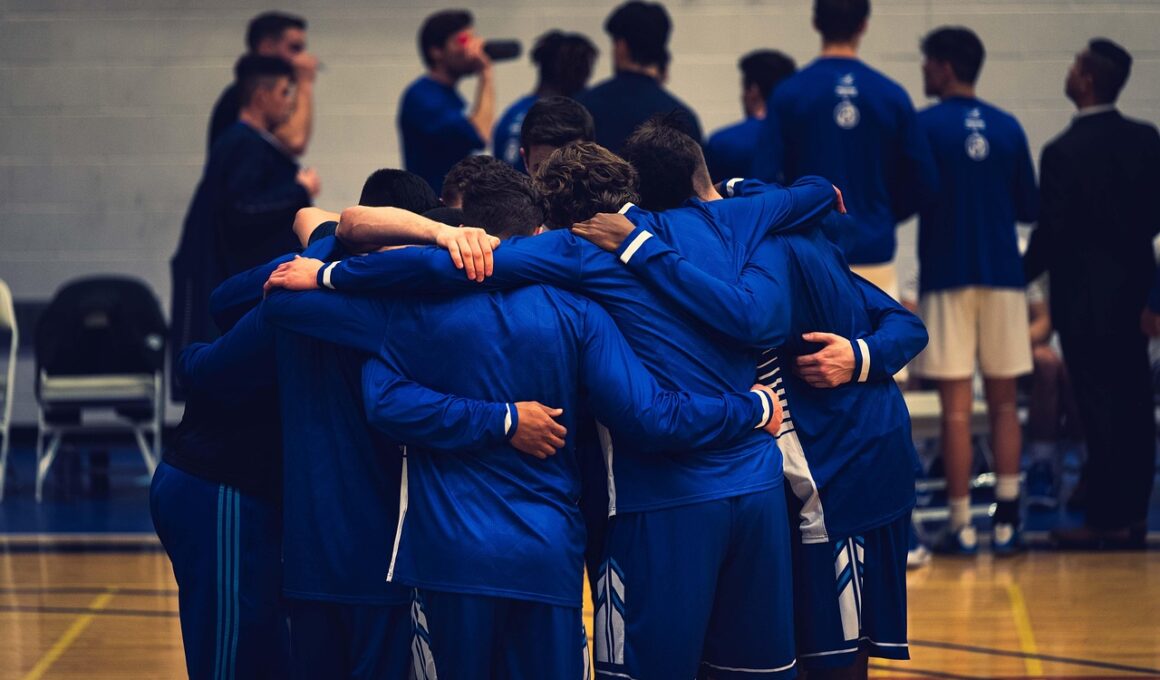How Team Building Exercises Can Reduce Basketball Team Anxiety
Basketball is not just about individual talent; it heavily relies on team cohesion and communication. Therefore, building an effective basketball team requires more than just drills and practices. Team building exercises serve as amazing tools to foster relationships among players. These exercises allow players to engage in cooperative tasks that boost their confidence and help mitigate specific anxieties related to performance. Anxious players often struggle with their abilities and question their contributions to the team, which can lead to negative outcomes during games. When players participate in team building exercises, they develop a sense of trust and camaraderie. This ultimately reduces individual anxiety as players feel supported by their teammates. Finding activities that encourage collaboration and communication can significantly improve overall morale. Activities such as group discussions, problem-solving tasks, and physical challenges build stronger interpersonal relationships that are crucial during high-pressure situations. The support gained from these activities translates into better performance on the court. Overall, team building exercises blend fun with functionality, ensuring players are both relaxed and well-connected, allowing them to focus better during games.
Team building exercises contribute significantly to reducing anxiety among basketball players by creating a supportive atmosphere. In such an environment, players feel more comfortable expressing their thoughts and concerns, which is essential for mental well-being. Engaging in physical activities fosters a sense of shared experience, allowing individuals to bond over overcoming challenges together. These shared moments can lead to friendships that strengthen collaboration on the court. Group activities such as trust falls, obstacle courses, or team challenges nurture connections that extend beyond the basketball court. As players strengthen their relationships, they also become more empathetic towards one another’s struggles and anxieties, which further builds a sense of belonging. When players believe their teammates are supportive, they can alleviate the internal pressures they may experience during games. It’s essential for coaches to implement regular team-building sessions to maintain this supportive dynamic. By incorporating group discussions and advising players on overcoming personal anxieties, coaches can foster an environment conducive to mental growth. Ultimately, this will enhance each player’s performance and well-being, creating a cohesive and resilient team.
The Impact of Trust on Performance
Trust is a cornerstone of effective teamwork, especially in basketball, where rapid decisions and unity are vital. When team members trust one another, their anxiety levels decrease, leading to improved performance on the court. Team building exercises create opportunities for players to demonstrate reliability and mutual support, fostering essential bonds. Engaging in fun cooperative activities allows players to learn about each other’s strengths and weaknesses, leading to greater trust and understanding. Once established, this trust translates into effective communication during games, where players feel confident enough to call out plays, offer support, or even admit mistakes without fear of judgment. Team building generates an environment where players can learn to depending on one another. This reduction in anxiety can significantly impact game performance, as players are more willing to step up in crucial moments when they know their teammates have their backs. Coaches can further enhance this dynamic by encouraging open communication and celebrating team successes, no matter how small. When everyone contributes to a shared goal, it creates a culture of teamwork that can overcome challenges both on and off the court.
A common misconception is that practicing basketball skills is sufficient to reduce anxiety. In reality, addressing the mental aspect of the game is equally important. Team building exercises help players shift their focus from individual performance to collective success. This shift can alleviate pressure, as players realize they are part of something larger. The camaraderie built during these exercises helps them feel valued and reduces the performance anxiety they may feel. Moreover, engaging in fun activities boosts motivation, keeps morale high, and allows players to relax. When players enjoy themselves, they become less focused on the fear of failure or disappointing the team. Coaches should encourage varied activities that cater to all team members’ interests, ensuring everyone can participate fully. Activities like game nights, team dinners, or community service projects can also foster connections beyond basketball. Investing time in building relationships off the court translates effortlessly onto the court, leading to enhanced team dynamics. This interconnectedness can give players the encouragement they need to overcome personal insecurities as they support one another in their shared journey as a team.
Creating a Positive Team Culture
Team building exercises inherently cultivate a positive team culture that minimizes anxiety. A positive culture emphasizes respect, openness, and shared responsibility. When team members feel their contributions matter, it creates an atmosphere where everyone can flourish, effectively reducing anxiety levels. Coaches play a crucial role in shaping this culture by modeling behaviors that promote unity and understanding. Activities that require collaboration and creative problem-solving encourage players to think together, aiding their ability to support each other. Team-building experiences help establish norms of positivity, where players can celebrate successes together and learn from failures collectively. This sense of belonging fosters resilience, allowing team members to face challenges head-on instead of shying away. Additionally, regular team check-ins can assess the emotional climate, where players can express concerns in a constructive manner. Coaches and players can then discuss strategies for overcoming anxiety both individually and as a group. As players continue to build relationships, their confidence grows, which reflects on their performance. Ultimately, establishing a positive team culture through team building exercises encourages healthier habits, resulting in lower anxiety and enhanced teamwork both on and off the court.
A crucial aspect of reducing basketball team anxiety through team building is honing communication skills. Strong communication fosters trust and connection, allowing players to express their feelings and experiences openly. Team building exercises such as role-playing games, group discussions, and feedback sessions encourage constructive communication among players. Players improve their listening and speaking skills through practice, helping them convey thoughts effectively during pressure moments. As a result, they feel more comfortable giving and receiving feedback, which contributes to team improvement. Active communication during team-building exercises also helps clear misunderstandings that can lead to tension within the group. By having the opportunity to work together in various settings, players learn to appreciate each other’s perspectives, enhancing mutual respect. This approach helps to ensure that all voices are considered, regardless of a player’s experience or skill level. When open communication is present, players are more likely to address personal anxieties collaboratively. To maintain this dynamic, schedule regular team-building sessions focusing on communication skills. The cultivation of these essential abilities not only reduces anxiety but also emphasizes that everyone has a role to play in the team’s success.
Conclusion: The Long-Term Benefits
In conclusion, incorporating team building exercises into basketball training provides long-term benefits that extend beyond just anxiety reduction. Such exercises enhance teamwork, communication, and trust among players, ultimately leading to improved performance. As players become more connected, their individual anxieties lessen, allowing them to focus on their roles within the team. Coaches should make team building a priority, recognizing its role in developing mental resilience. Engaging activities not only break the monotony of regular practices but also help create a fun and supportive environment. Over time, players who participate in ongoing team-building initiatives are likely to become more integrated and supportive of one another. This integration transforms the team into a cohesive unit capable of overcoming challenges. The positive experiences gained through these interactions will shape behaviors and attitudes even outside basketball. Investing in meaningful interactions among players fosters not only great athletes but also long-lasting friendships that last beyond the court. For basketball teams striving for greatness, not addressing the emotional side of the game can hinder progress. Therefore, integrating regular team building initiatives is indispensable for any successful program.
The implementation of team building exercises can be the missing link for coaches aiming to reduce anxiety in their basketball teams effectively. It offers a structured way to foster emotional connections among players, strengthening the foundation of teamwork. Coaches should include varied activities catering to different skills and interests, ensuring engagement from all team members. From physical challenges to creative problem-solving tasks, each exercise serves to facilitate interaction and amplify the team spirit. By prioritizing these exercises, coaches are laying the groundwork for successful performances under pressure. As players experience trust and develop friendships through shared experiences, they help establish an environment of collaboration. An emotionally healthy team is more resilient and better equipped to handle nascent anxieties. Teams built on trust and mutual understanding foster proactive communication, allowing players to express any concerns without fear of judgment. When anxiety is reduced, the overall cohesion and unity within the team grow stronger. This conducive atmosphere prepares players mentally and physically, position them to excel in high-stress situations during competitions. Ultimately, integrating well-planned team building exercises into training regimens yields fruitful results for both players and coaches alike.


